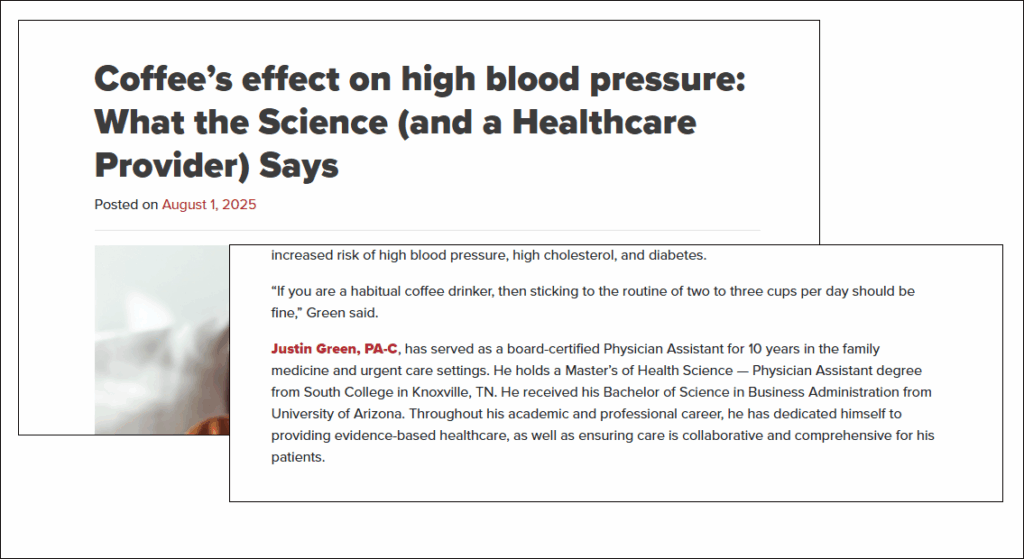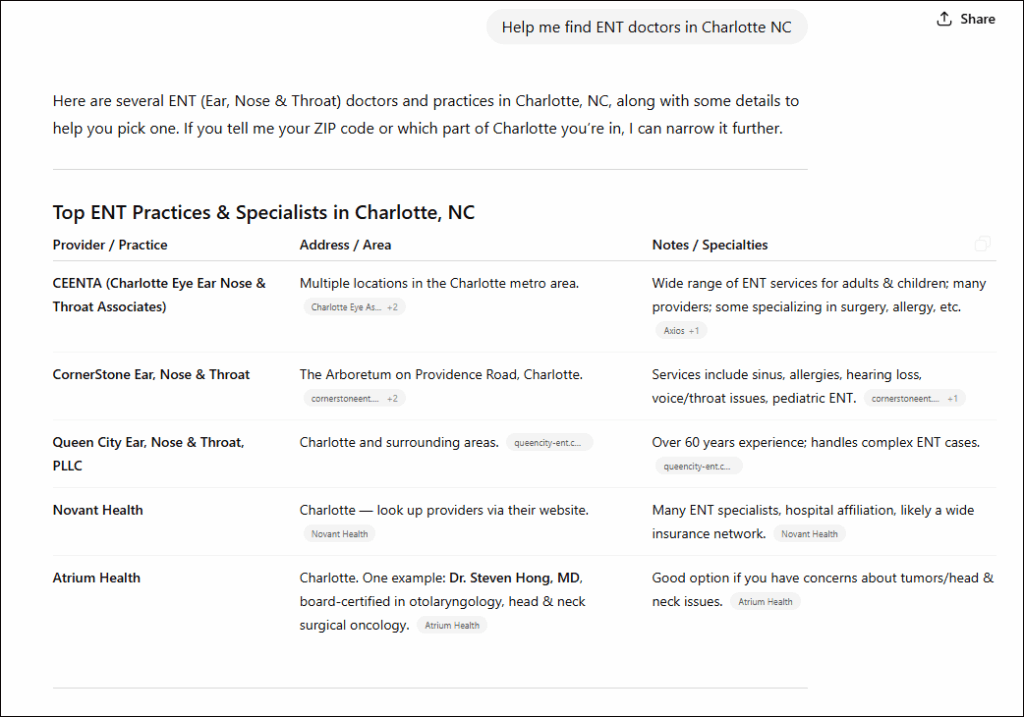Patients don’t just turn to Google to find a provider, service, or medical advice. People also rely on AI-powered tools for answers. Voice assistants, navigation apps, chatbots, and generative search engines have shifted search behavior dramatically.
Healthcare providers’ websites must now be optimized to appear on two engines: traditional search (aka Google) and generative AI (like ChatGPT and Gemini). Staying visible to patients requires healthcare SEO focused on creating high-quality, credible, and compliant content that’s structured for all search tools.
SEO vs. GEO
SEO and GEO tactics each result in content that builds patient trust and confidence, but they increase a healthcare facility’s visibility in different places. SEO provides the foundational quality signals required for traditional search engine rankings, while GEO helps to secure a spot in AI responses.
Google and other engines use semantic matches or exact queries to populate results, while AI-powered engines contextualize the query to discover resources. That means healthcare content needs to consider keywords and conversational, natural language to earn high marks in both engines.
The difference is also in delivery. Imagine a traditional search engine results page like a lab report. It lists all of the results clearly, allowing a patient to interpret relevance and meaning. An AI results page acts like a patient-doctor consultation on the report. The generative response interprets and contextualizes the lab results, providing personalized recommendations for the situation.
Though I’m comparing SEO and GEO, I don’t mean to steer you toward one or the other. You need both, as good SEO is good GEO. Press Ganey research on consumer trends in healthcare confirms that 59% of patients search online for primary care providers, a number that’s nearly tied with personal and professional referrals. Healthcare companies must focus on visibility on AI-powered search and in traditional rankings if they want patients to find their facility or physician.
SEO Best Practices That Support Healthcare GEO Goals
The best SEO strategy for a healthcare site is comprehensive, highlighting the provider’s expertise, answering searchers’ questions, and securing local listings while remaining compliant. The good news is that agencies experienced in providing healthcare SEO services have been mastering these tactics for years. When your content strategy aligns with best practices, you’ll need fewer adjustments to earn generative AI citations.
Since the healthcare industry uses SEO content to attract new patients, increase local awareness, and educate and inform, it must be compliant, accurate, and authoritative.
Here are some tips to get your brand in front of patients who Google medical services and prep your content for citations in generative responses.
Raise the Bar on Content
Your landing pages, service and product pages, and blog articles need to provide value, guiding patients to answers and solving problems. To earn quality scores worthy of ranking in the SERPs and to gain citations in AI platforms, healthcare content must demonstrate E-E-A-T—Experience, Expertise, Authority, and Trustworthiness.
Double-check your patient-focused content demonstrates E-E-A-T by asking yourself these questions:
- Experience: Is the content written with real-world perspectives? Does it answer actual patient problems and provide insights from practicing doctors?
- Expertise: Does the content provide physician biographies, bylines, and credentials that prove authorship or reviewers?
- Authority: Does the site have backlinks, cite reputable medical organizations, and feature credible industry awards or accreditations?
- Trustworthiness: Are the sources current, and is the content accurate and transparent?
E-E-A-T In Action
Here’s an example of how to achieve E-E-A-T in a medical blog. Let’s say your audience wants to understand what wellness exams are and what to expect.
- Share the experience by explaining what typically happens during a wellness exam.
- Include quotes from primary care physicians or a doctor-approved checklist to show your expertise.
- Cite authoritative sources, such as screening guidelines from the U.S. Preventive Services Task Force.
- Add ‘reviewed by’ badges or the author’s byline to bolster the article’s trustworthiness.
The image below shows a smart solution to build trust and expertise. From the header to the quoted text and the physician’s biography, this page provides excellent authority and trust signals.

Prioritize Compliance
I probably don’t need to tell you that healthcare is a high-stakes industry, but I will remind you that this sentiment also applies to online content. Your site’s visibility hinges on compliance with several standards, including Your Money or Your Life (YMYL, meaning sensitive topics in which a wrong answer could cause harm) and HIPAA privacy protections.
Google and AI-powered platforms scrutinize YMYL content to make sure it doesn’t misinform or mislead readers. If you’re thinking to yourself, “I’ll just let a bot draft my content, so I don’t need to worry,” think again. Medical content authored by AI requires extreme oversight to avoid ethical, legal, and safety challenges that can hinder your site’s visibility—and damage your brand’s credibility.
When drafting content for a clinic, hospital, or medical center, providing safe, transparent, credible information is paramount. If you aren’t sure whether your content hits the mark, ask a healthcare SEO expert.
Here are a few filters I keep in mind while reviewing medical-related content for HIPAA and YMYL compliance:
- Does the content make vague or generalized claims that could be harmful?
- What is the information source? Do links, quotes, or bylines make it obvious?
- If there are forms, do these feature security measures to protect patient data?
- Are cited references from reputable sources, such as the CDC, NIH, or Mayo Clinic?
- Is the content driven by solutions and answers rather than keywords?
If this list caught you by surprise, it’s time to make updates. But don’t worry—periodically refreshing your content can also help with rankings and GEO placement.
Structure the Content
Besides relying on headers, paragraphs, and bullet points to organize site content, healthcare SEO experts also recommend implementing schema markup. This adds code, known as structured data, to your site explaining your services and offerings in a language that LLMs and search engines understand.
An SEO manager at our agency, Sabrina, says, “Structured data improves healthcare SEO by reinforcing local keywords, increasing service and practice area accuracy, and confirming a provider’s compliance.” Using markup strengthens the overall SEO strategy, and also increases the likelihood of users interacting with the results by clicking through to the site or contacting the provider.
Healthcare companies should use different types of schema on service, treatment, and provider pages to better match high-intent queries, no matter which search tool people use. Sabrina has walked us through a few different markups recommended for medical practices, facilities, and physicians:
- LocalBusiness schema, such as MedicalBusiness and Physician, tells search engines and LLMs whether a page is relevant to “near me” or “near [location]” queries.
- MedicalProcedure or MedicalTherapy schema tells LLMs and search engines which specific services or procedures a practice offers, helping increase result accuracy for people searching for ENT doctors, dermatologists, or other specialists.
- IndividualPhysician and Physician markup on provider profile pages can specify medical services, affiliated hospitals, star rating, and other information.
- Property Identifier usNPI adds the provider’s National Provider Identifier on the page, boosting authority and trust signals for HIPAA compliance.
- Property practicesAt schema can help search engines connect the dots between a physician and the medical offices and clinics where they practice, which can be especially helpful if a provider serves multiple locations.
The image below shows a query for an ENT doctor in Charlotte, NC, performed on ChatGPT. Thanks to what is likely MedicalProcedure schema and LocalBusiness schema, the LLM was able to offer a list of providers based on their addresses and include information on the practices and specialities to help the searcher narrow their choices.

If you aren’t working with a healthcare SEO expert to implement structured data, Sabrina recommends using schema markup generators from dentsu (previously Merkle) to simplify the process. Or, give us a call and let us help.
Remember Your Local Audience
Boosting a healthcare facility’s local SEO is another excellent way to increase trust signals with potential patients, search engines, and generative AI tools. Here are five quick tips to enhance a provider’s local presence online:
- Encourage reviews, respond to feedback, and highlight testimonials: AI tools often pull sentiment into results, and patients rely on reviews when selecting healthcare providers.
- Use local keywords on service pages: Including city or landmark references, such as a neighborhood, can help connect with people searching for services nearby, such as “pediatric medicine near River North.”
- Optimize your Google Business Profile (GBP): Claim and verify your profile, then complete the profile details with hours, services, accepted insurance, and professional photos—patients trust what they can see.
- Streamline listings: Your Name, Address, and Phone Number (NAP) should be consistent across all platforms and local directories to prevent confusion for potential patients and search engines.
- Offer locally relevant content: Publish articles on local flu clinics, seasonal or regional health advice and reminders, and community outreach to show search engines and AI tools you’re relevant in the area.
GEO-Specific Tips for Healthcare Companies
Healthcare companies should use GEO tactics to enhance SEO, not replace it. Using both will increase visibility across all platforms where patients search. SEO and GEO aren’t only important for driving traffic; they also build patient trust by demonstrating a provider’s authority and offering transparent, trustworthy resources.
Good SEO practices will take care of most of the essential optimizations for AI-powered search. That said, there are a few areas you can zero in on to improve your site’s compatibility with generative platforms. These include:
- Create answer-first content: Don’t bury the lede. Answer the query directly and accurately to encourage AI to cite your page.
- Test how generative platforms respond: Ask AI platforms queries in your specialty area and evaluate the responses. If you aren’t in the results or you appear but it isn’t accurate, revisit your page content and optimize for accuracy and compliance.
- Include summaries and FAQs: Generative AI loves to cite content summaries, such as TL;DR, and FAQs because these often provide direct responses to AI-powered search queries.
- Stick to real-world numbers, citations, and quotes: Generalities and approximates aren’t answers that generative AI will use as resources because they don’t provide actual answers and introduce credibility concerns.
- Write in plain language: Definitions, questions, and answers should be written in easy-to-digest language mirroring how people interact with chatbots and voice assistants (“What does high blood pressure mean?” versus “What is hypertension pathophysiology?”).
- Tailor responses for intent: Pay attention to which queries only require quick answers (What is considered hypertension?) and those that need step-by-step guidance (How do I lower my blood pressure without medication?), then craft content to match searchers’ expectations.
- Don’t sleep on PR: Your reputation not only influences patients, but PR also impacts search rankings and visibility. Mentions and backlinks help search tools understand your brand, expertise, and authority, and these factors also sway GEO citations.
Online visibility is a healthcare provider’s lifeline. SEO keeps you discoverable in traditional search, and GEO helps encourage citations in AI-powered tools. If you’re curious how to create a comprehensive strategy for your healthcare website, let’s talk. We’d be glad to explore optimization strategies to help you connect with patients wherever and however they search.





